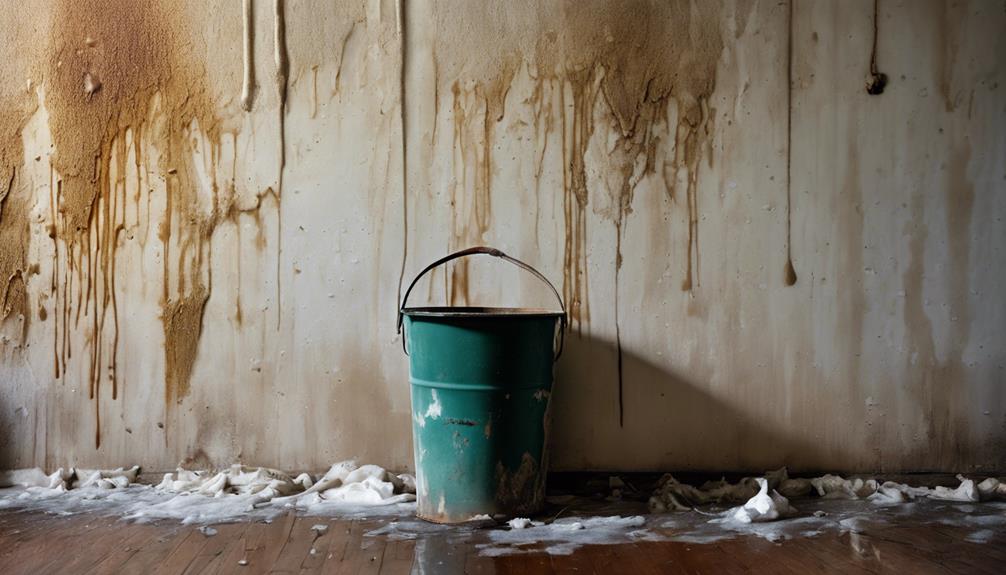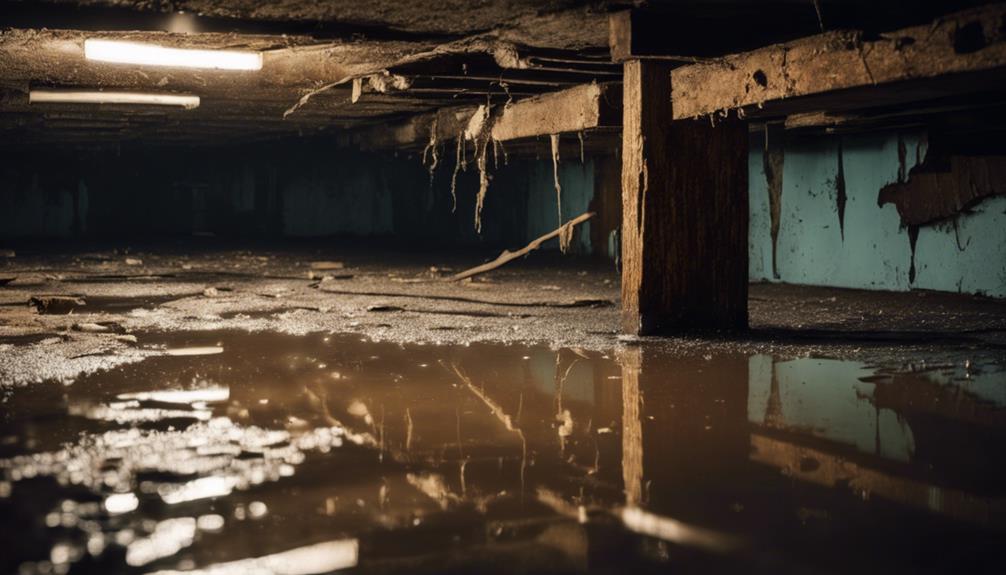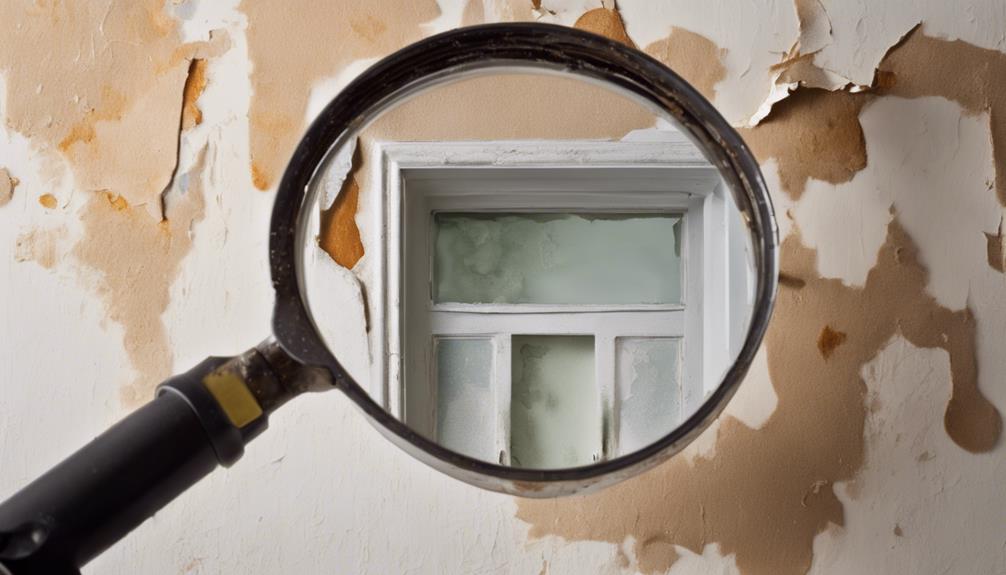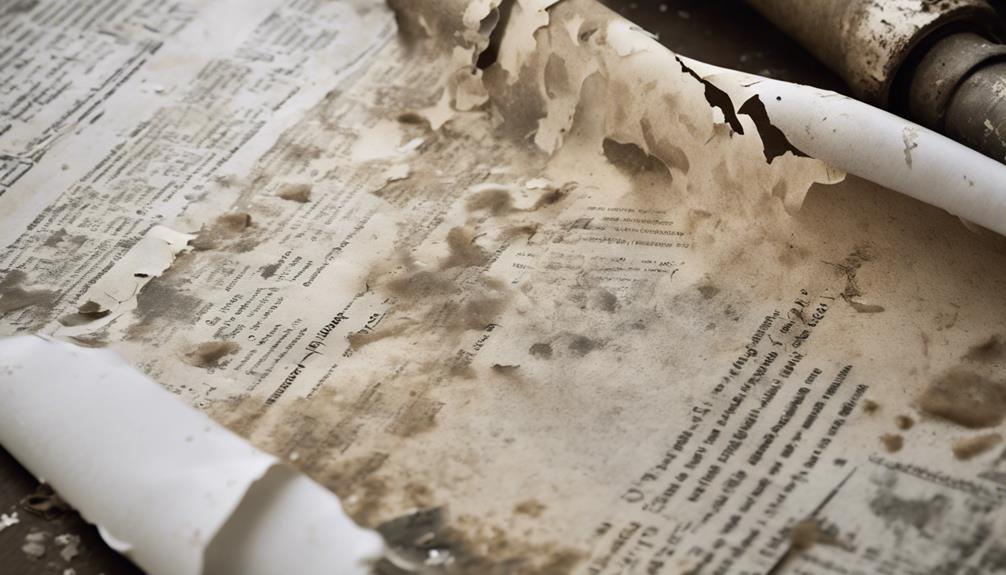
You have to disclose any history of water damage when selling your house. If you fail to do so, you could face serious legal consequences, including financial penalties and potential lawsuits from buyers. Water damage can lead to significant repairs and reduce your property's value. Being transparent about such issues builds trust with potential buyers. It's crucial to document any repairs related to water damage and understand your disclosure obligations under the law. Curious to know more about your rights and responsibilities when it comes to water damage? There's plenty of important information to consider before you sell.

Water damage is a serious concern that can significantly impact your property's value and safety. It can lead to severe structural issues, mold growth, and health risks, making it crucial to understand its implications when selling your home.
In California, you need to be aware of latent defects and the importance of disclosing any existing water damage during a home inspection. Homeowners should also consider reviewing their insurance coverage for water damage to understand potential financial protections and responsibilities.
Common sources of water damage include poorly maintained roofs, old plumbing, and leaks from appliances. Repair costs can range from about $2,800 to over $10,000 for severe cases, so identifying the source is essential for effective remediation.
If you notice any signs of moisture, it's vital to act quickly, as water damage can attract pests like termites that further compromise your property's integrity.
You should also consider that homeowners insurance may cover certain repairs related to water damage, but exclusions often apply for existing conditions. Being proactive about addressing water damage and understanding its implications can save you from potential legal and financial troubles down the line.
Always prioritize thorough inspections and necessary repairs to maintain your property's value and safety.
Understanding your seller disclosure obligations is crucial when selling a home in California. You're legally required to disclose known material defects, including any history of water damage, as stated in the Transfer Disclosure Statement (TDS). This obligation ensures transparency and protects both you and potential buyers.
Here's a quick overview of your seller disclosure responsibilities:
| Disclosure Requirement | Details |
|---|---|
| Water Damage History | Disclose any past incidents of water damage. |
| Significant Repairs | Document major repairs related to water issues. |
| Mold Issues | Report any mold problems that arose from water damage. |
| Legal Repercussions | Non-disclosure can lead to legal action from buyers. |
| Transparency | Honesty in disclosure promotes trust in the home sale. |

If you fail to disclose known water damage when selling your house, you could face serious legal consequences.
Buyers have rights and remedies available to them, which may include seeking compensation for repairs and damages.
Understanding these implications can protect you from potential lawsuits and help you navigate the selling process more effectively.
Selling a house comes with a responsibility to disclose known issues, and ignoring this duty can lead to serious legal consequences. In California, as a seller, you must disclose any material facts, including a history of water damage. Failure to do so can result in legal action for non-disclosure or misrepresentation, which can be costly.
Concealing water damage not only risks your reputation but can also lead to significant financial penalties. Buyers may seek compensation for repair costs or reductions in property value due to your lack of disclosure. If they discover undisclosed water damage post-sale, they've the right to take legal action against you, making it essential to be transparent.
Intentionally hiding water damage can escalate the situation to allegations of fraud, complicating legal proceedings and potentially leading to harsher penalties against you. Additionally, buyers may claim emotional distress if they feel deceived.
In real estate transactions, honesty is crucial; the legal consequences of concealment can far outweigh any temporary benefits you might perceive from hiding such critical information. Protect yourself by being upfront about any water damage.
Buyers have specific rights when it comes to undisclosed water damage, and knowing these rights can help protect your investment. In California, the seller is required to disclose material facts, including any known water damage, as it can significantly affect property value.
If a home seller fails to disclose such information, you may pursue several remedies.
Navigating these issues can be complex, so it's crucial to consult with qualified real estate attorneys for legal advice tailored to your situation.
They can guide you through the legal implications of non-disclosure, ensuring you understand your buyer rights and remedies.
Many homeowners may not realize the subtle signs of water damage lurking in their property. Common indicators include discoloration on walls or ceilings, which often suggests leaks or moisture buildup.
If you notice a musty odor, that could signal visible mold growth, a direct result of undetected water damage. This poses serious health risks and requires immediate attention.
Additionally, warped or buckled flooring, particularly near bathrooms or kitchens, can indicate previous water exposure and potential structural issues.
Keep an eye out for stains on carpets or walls that persist even after cleaning; these may point to hidden water damage that needs further investigation.
If you've made repairs, it's crucial to disclose any history of water damage on your disclosure form. Being upfront about visible mold growth or past leaks not only protects you legally but also fosters trust with potential buyers.

Investing in a comprehensive home inspection is essential for uncovering hidden issues, particularly those related to water damage. In California, while sellers are required to disclose known issues, many latent defects may remain hidden without a professional inspection.
By engaging an inspector before making an offer, you can avoid unexpected repair costs that average around $2,800 for water damage repairs.
Here are some key benefits of home inspections:
During inspections, be on the lookout for discoloration, musty odors, and other indicators of water damage.
A thorough inspection empowers you to make a sound investment and ensures that you're aware of the true state of the property.
Ultimately, a professional inspection can save you significant money and stress, making it an invaluable step in the home-buying process.
Understanding the seller's knowledge of any past water damage is vital when you're considering a property. Sellers are legally obligated to disclose known water damage if they're aware of it. If the seller knew about the damage and fails to disclose it, they could face significant legal consequences under California real estate law.
To establish this knowledge, look for evidence such as repair records, contractor testimony, or insights from neighbors. The seller's intent also plays a crucial role; proving they knowingly concealed water damage can bolster your claim for nondisclosure. Such documentation can indicate that the seller was aware of the issue, potentially substantiating your claims in any legal proceedings.
Additionally, professional inspections are essential. They help uncover any undisclosed water damage, which can further support claims against sellers for failing to disclose material defects.

If you discover water damage after purchasing a home, taking immediate legal steps is crucial to protect your rights.
Start by consulting a California real estate attorney who can guide you through your options. If you can prove that the seller failed to disclose the issue, you may have grounds for legal action. Evidence such as contractor testimony or repair documentation will be valuable in building your case.
Here are some steps to consider:
Once you've assessed your legal options after discovering water damage, it's important to explore potential remedies that can help mitigate your losses.
In California, you can seek compensation for repair costs related to undisclosed water damage, which typically averages around $2,800 but can exceed $10,000 based on damage severity.
Legal remedies available to you include claims for reduced property value due to undisclosed defects, and you might even seek recovery for emotional distress caused by the seller's nondisclosure.
Acting quickly is crucial, as California's statutes of limitations can limit your time frame for filing claims regarding non-disclosure.
Start with negotiation and mediation with the home sellers; these initial remedies often lead to compensation for necessary repairs without the hassle of litigation.
However, having an experienced real estate attorney can make a significant difference. They can provide you with essential guidance on your rights and the potential success of your claims concerning undisclosed water damage.

Navigating the complexities of disclosure laws can be daunting, especially when it comes to water damage. That's where legal representation becomes vital. An experienced attorney helps you comply with California Civil Code requirements, ensuring you disclose water damage properly. This guidance is crucial for preparing the Transfer Disclosure Statement (TDS) accurately, which can protect you from liability for undisclosed defects.
Consider these key points:
With legal representation, you can navigate the nuances of water damage disclosures confidently. You'll not only safeguard yourself against potential water damage claims, but you'll also ensure that your sale goes smoothly.
Understanding your responsibilities and having someone to guide you through the process helps mitigate risks associated with undisclosed defects. Ultimately, having an experienced attorney by your side can make a significant difference in protecting sellers' interests throughout the sale.
Yes, water damage significantly affects your home's value.
It can lead to lower home appraisals and negative buyer perception, making potential buyers wary. Repair costs can easily exceed $2,800, impacting your ability to negotiate.
Additionally, insurance implications may arise, complicating the sale. Market trends show homes with water damage struggle during property inspections, often requiring a lengthy remediation process, which further diminishes their worth in the eyes of prospective buyers.
If you're selling a property, you've got seller responsibilities that include adhering to disclosure laws.
Failing to disclose defects can lead to legal implications, including potential lawsuits from buyers. They're protected by laws that require transparency, and property inspections often reveal hidden issues.
Ethically, you should disclose known problems to avoid complications. Offering home warranties can help mitigate concerns but doesn't replace the need for honesty about defects that could impact the buyer's decision.
When selling a house in California, you've got to adhere to strict disclosure requirements.
Your seller obligations include revealing the property's condition, any inspection reports, and potential environmental hazards.
Buyers have rights to know about significant defects, so be honest about issues like structural damage or past repairs.
Failing to disclose could lead to serious legal implications, including lawsuits.
Transparency not only protects you but also fosters trust in the transaction process.
You need to understand the importance of damp in your home.
It's crucial to know damp detection methods and damp inspection importance before selling.
Consider damp prevention tips to avoid issues, especially in basements.
If you've dealt with damp, explore damp repair solutions to ensure a healthy environment, as damp health risks can affect buyers.
Remember, having damp insurance coverage can help protect you if problems arise after the sale.
Transparency is key!
When selling your house, it's crucial to disclose any water damage. Not only does it protect you legally, but it also fosters trust with potential buyers. Ignoring this obligation can lead to serious legal consequences and financial losses. By being transparent and conducting thorough inspections, you can avoid disputes down the line. Always consider getting legal representation to guide you through the process and ensure you're meeting all disclosure requirements. Your honesty can make a big difference!